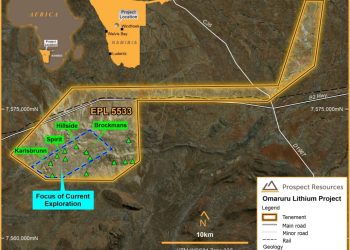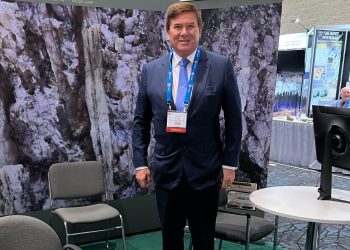
Lepidico says the expected cost of the Karibib project has been lowered by approximately 20%, equivalent to around N$244 million, due to a change in the technical configuration plant which could eliminate the need for a 27km power line spur.
According to the latest study, advancements in solar power, energy storage, and backup systems could eliminate the necessity of a power line. The study notes that while operating costs may rise, the net present value outcome remains neutral.
The latest development is significant as the project, situated at Karibib in Namibia and comprising two components – upstream and downstream, with downstream requiring US$63 million (N$1.2 billion) in development capital to commence, as per a completed feasibility study.
“Advancements in solar power generation efficiency and energy storage, coupled with considerations for backup systems such as biodiesel and diesel, have paved the way for an off-grid power solution to be explored in Karibib,” CEO of Lepidico, Joe Walsh, said.
He said this solution could then eliminate the need for the 27-km power line spur to connect to the local substation
“Investing in solar power generation and energy storage technologies allows us to reassess our infrastructure needs and explore more cost-effective solutions for power supply in Karibib,” Walsh stated.
Walsh emphasised the importance of flexibility in the early years of operation, especially as mining activities transition between locations within the region.
“The project team is evaluating lease alternatives for ore crushing using mobile units, providing the flexibility needed as mining moves from Rubicon to Helikon and back to Rubicon,” he said.
This comes after an evaluation in Karibib had identified potential cost reductions in development capital, estimated at US$63 million upon the completion of the Front-End Engineering & Design (FEED) phase.
Meanwhile, the CEO noted that preliminary assessments suggest that while operating costs may increase, the overall net present value (NPV) remains neutral.
Furthermore, Lepidico plans to resume Stage 2 implementation works, particularly under the Engineering Procurement & Construction Management (EPCM) contracts for both the chemical conversion plant in Abu Dhabi and the Karibib concentrator, pending secured project funding.
Despite the focus on Karibib, Lepidico remains committed to the development of a chemical conversion plant in Abu Dhabi.
He said the strategic advantages of this venture include established infrastructure, affordable energy, and local markets for bulk products.
Walsh highlighted ongoing efforts to engage with leading equipment manufacturers to identify cost savings and shorten lead times for equipment supply.
Regarding funding, Walsh expressed the company’s determination to fast-track the business to free cash flow generation and demonstrate the commercial viability of its process technologies.
While funding processes for Phase 1 have faced delays, he said renewed private sector interest has been observed, particularly in Lepidico’s proprietary process technologies.
Walsh then said the company needed the funding to establish the upstream component of the project, which includes the development of a lithium mine and concentrator.
The company will need another US$200 million (N$3.8 billion) for the downstream component comprising the construction of a chemical conversion plant in Abu Dhabi.
“About US$50 million (N$950 million) out of the US$63 million (N$1.2 billion) needed for the project is expected to come from the US Government’s International Development Finance Corporation, with the remaining portion requiring equity financing. We’re in discussions with potential strategic and offtake partners regarding this equity funding,” Walsh said. He said the feasibility study, front-end engineering, and design for the initial phase are already completed, with the project poised for the construction phase.







